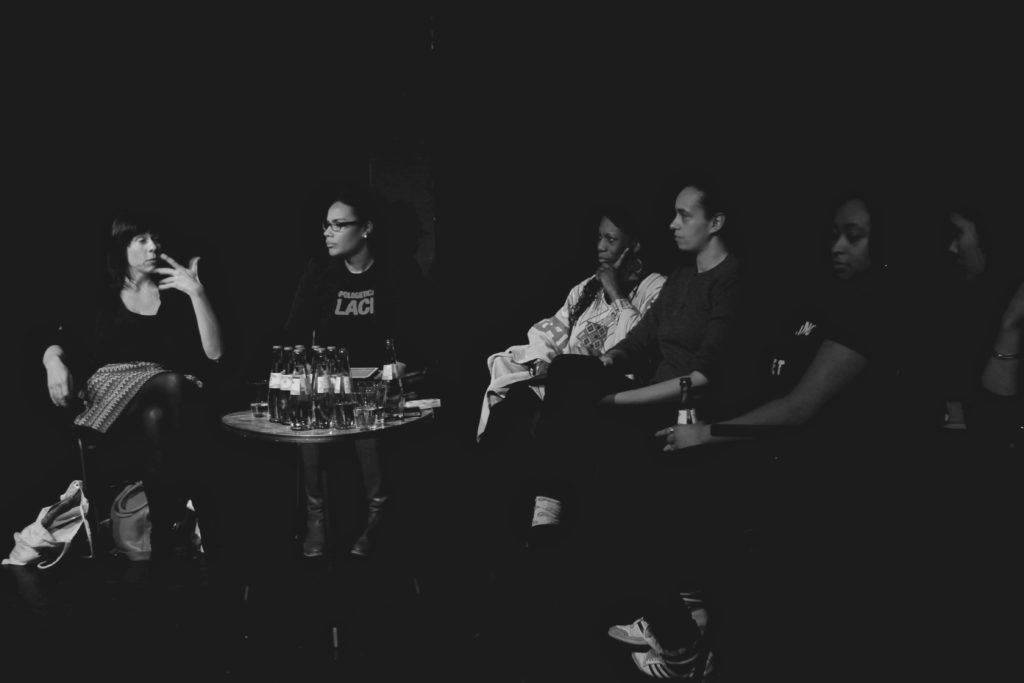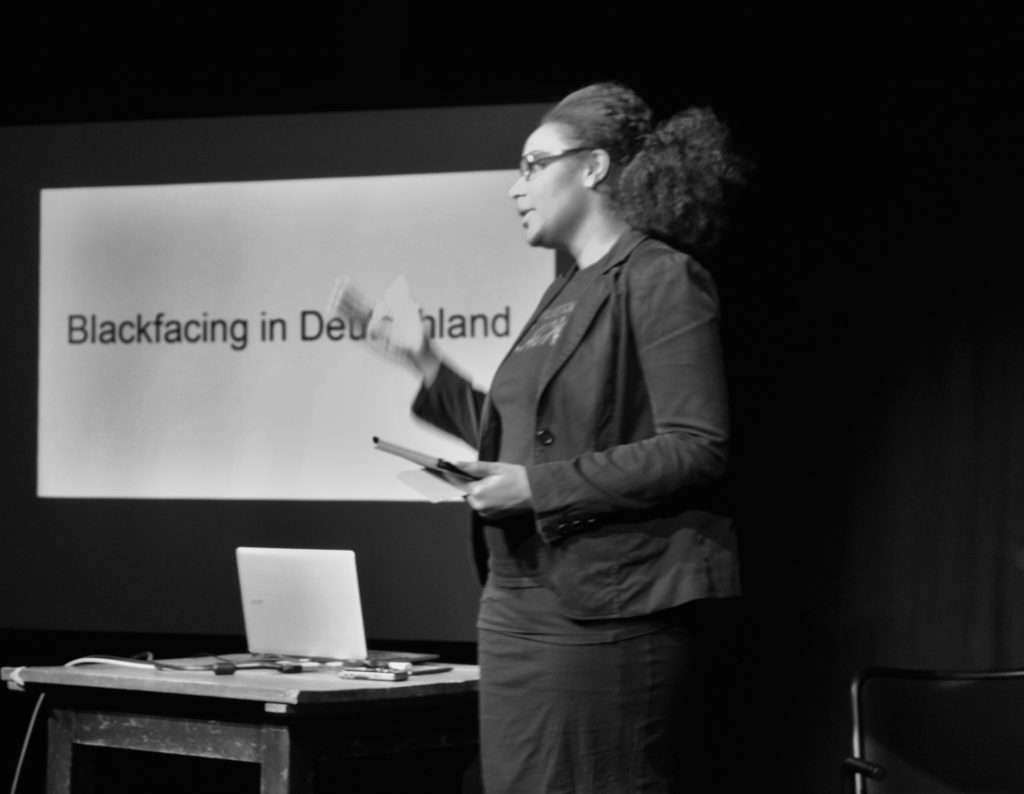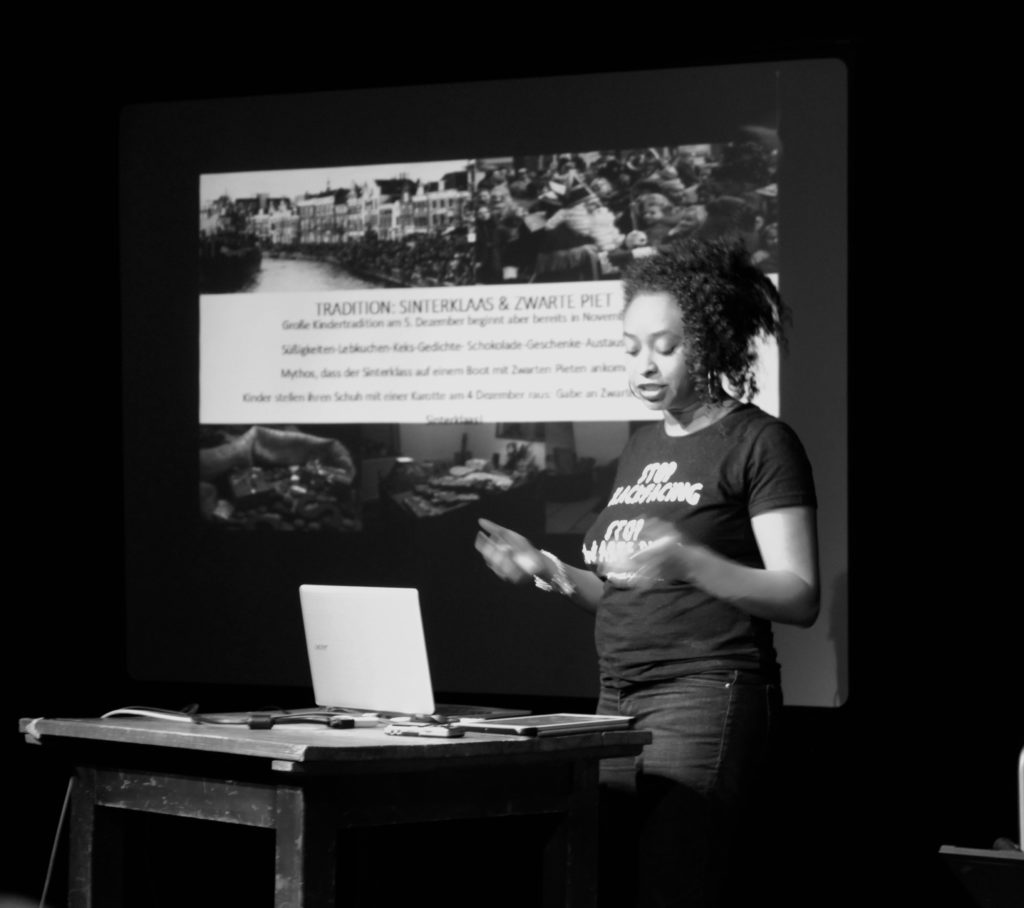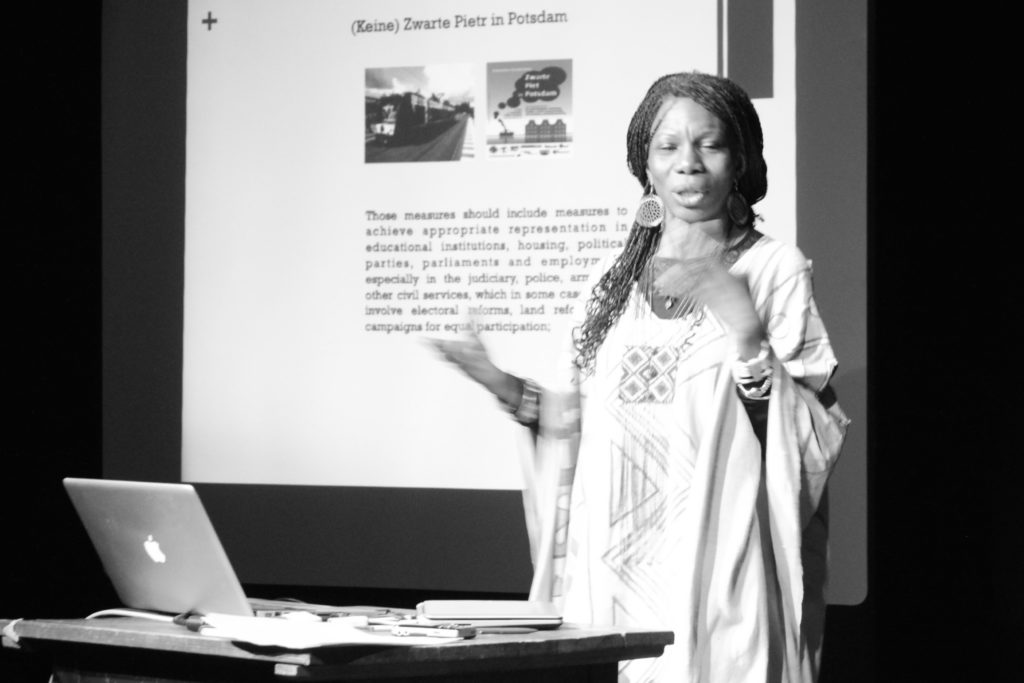Colonial Legacy – Zwarte Piet in Potsdam
In December 2015, T-Werk in Potsdam hosted a panel discussion which set out to provide background information on the connection between racism and the German and Dutch use of the tradition of blackface. This event was a reaction to the highly emotional debates in Potsdam around the well-loved Sinterklaas celebration and especially the traditional performance of Zwarte Piet. Fortunately, the city of Potsdam has decided to deny any financial support of the event in case it continues to include the racist practice of blackfacing the Zwarte Pieten characters. Potsdam has thus declared itself against a perpetuation of colonial traditions. The Förderverein zur Pflege niederländischer Kultur in Potsdam e. V. (organization for the maintenance of Dutch culture) and a number of local people, however, cannot comprehend the city’s decision and lament the disappearance of the clownesque servant in black paint who has, so far, always been part of the celebration. By them, Zwarte Piet is understood as a crucial part of the Dutch tradition and seen as an unchangeable and necessary constant.

The panel, which was mainly organized by the Initiative Schwarze Menschen in Deutschland Bund e.V. (Initiative of Black People in Germany, ISD) and supported by various organizations, aimed to provide a look at the hidden colonial-racist history behind the Zwarte Pieten. Up until now, local newspapers choose to mainly publish perspectives of people who are not victims of racism and who have insufficient knowledge about racism’s manifold ramifications. Thus, it has so far been neglected to adequately fill the rather widely spread gap in knowledge when it comes to racism. Many people still emphasize that blackfacing or racist expressions are not intended to be nasty and degrading. Such an opinion ignores that an action or utterance can hurt in defiance of other intentions. Furthermore, the one-sided media reportage supports the wrong impression that it is only a very small group of radical activists who want to take away Potsdam’s well-loved children’s festivities. This is clearly wrong, which can already be seen in the number of participating initiatives in the organization of the panel discussion: ISD, Afrika-Rat Berlin-Brandenburg, European Network of People of African Descent (ENPAD), Postcolonial Potsdam, Antidiskiminierungsberatungsstelle Brandenburg and several Dutch allies. The event has readily received financial support from the city of Potsdam, the Amadeu Antonio foundation, the AStA of the University of Potsdam and the Rosa Luxemburg foundation. Many thanks for that. The panel had been planned to make those voices which position themselves against racism and its societal reverberation heard. As a public event, it was also meant as an invitation to start a dialogue with Potsdam’s citizens and the local press.

Jamie Schearer of ISD led us through the evening. The first input was provided by Jessica de Abreu who is, among other things, co-founder of the Dutch activist group Kick Out Zwarte Piet (KOZP). Jessica emphasized the importance of an exchange between Germany and the Netherlands, especially when it comes to dealing with their colonial-racist traditions and the efforts for change. She explains that the Zwarte Pieten are a remnant of the enslavement of Black people and that it is highly problematic that the Sinterklaas festivities celebrate an iconography of slavery in spite of an official UN declaration against it. The annual festivities are accompanied by songs, (chocolate) figurines and advertisements which are already visible several weeks earlier. For decades, children have been and still are exposed to racial imagery in their earliest ages. This, even if unconsciously, forms their understanding of Black people and has harmful consequences not only for white children, but also for Black children: white children get taught to look down on Black people, Black children learn to believe that they might be equally laughable as Zwarte Piet. Such ways of thinking favor the continuation of institutional racism: Jessica told us that it is usually suggested to Black Dutch students to strive for lower types of schools, Dutch society does not see it as self-evident that they should do their A-levels and study at university. Jessica, however, is the best example that Black people do not have to remain in serving positions or laughable roles, she herself has two M.A. degrees in spite of the recommended Hauptschul-visit. Jessica gave a detailed report on the protests against the Zwarte Pieten in the Netherlands. In the last couple of years, they repeatedly ended with the violent arrest of non-violent protesters by the police. The demand to raise one’s own political voice, sometimes even only in form of a slogan T-Shirt or sheer presence of a Black person, is perceived as disturbance of the colonial public order. Jessica campaigns against any kind of Piet performance even in a changed way without makeup or with colorful makeup. Minor cosmetic changes do not change the fundamental colonial idea on which this set-up is based.

Elisabeth Nechutnys was the second speaker of the night. She works at the University of Potsdam and is a co-founder of Postcolonial Potsdam, a working group of the organization weltweiterdenken e.V.. Postcolonial Potsdam organizes cultural events in Potsdam, teaches seminars and offers guided tours to point to Brandenburg’s colonial legacies. In her talk she addressed Brandenburg-Prussia’s early colonial history. In the 17th century, Brandenburg-Prussia established the trading colony Großfriedrichsburg at the coast of today’s Ghana to create a base for ivory trade, exotic animals and Black people who were involuntarily shipped as slaves to the Americas. 10.000-30.000 people have been displaced in the short period of Brandenburg’s reign over the colony and only 1/10 survived the passage. Nowadays, only a few people in Brandenburg have heard of its history of slavery; it does not get taught in school and guide books also usually omit that information. However, there are many traces of Potsdam’s colonial history and exploitative practices in Potsdam’s castles and Park Sanssouci. Elisabeth told us that already with the first passage to Großfriedrichsburg, Friedrich, the Great Elector, ordered Black people as servants for court (so-called Hofmohren) and the end of the colony is also connected to the purchase of Black men. In 1718, Prussia sold Großfriedrichsburg to the Netherlands for money and a number of Black men. Nowadays, we can see these Black servants dressed in exotic costumes and gold jewelry exhibited on paintings in Potsdam’s castles, but their background presence is usually not commented upon. Finally, Elisabeth refers to a newly sparked interest in Großfriedrichsburg in the year 1885, the year of the “Africa Conference”, and a simultaneous aspiration of the German nation state and national consciousness of the late 19th and early 20th century.

Marianne Ballé is among other things vice president of the Afrika-Rat and a founding member of the Pan African Women’s Empowerment and Liberation organization. Marianne is completely against the Zwarte Pieten, just like Jessica. She points out that in 2015 the UN Decade of People of African Descent started. Already in the Declaration of Durban, a UN world conference against racism, racist discrimination and xenophobia and the connected intolerance, it has been clearly recognized that people of African descent, who nowadays live in all parts of the world, were victims of slavery, slave trade and colonialism. They still have to suffer from the consequences. The panel discussion and the abolition of Sinterklaas’ traditional attendants could, according to Marianne, be read as a contribution to the UN Decade of People of African Descent. She explains the three cornerstones of the Decade: (1) recognition, (2) justice and (3) development. In case of the abolition of the Zwarte Pieten in Potsdam, we could talk about it as recognition of colonialism as extensive form of destruction; It would be a step towards justice because charges of racism would be taken seriously; it would be a development in favor of a togetherness, against the prevailing exclusionary gap. Marianne emphasizes the effective force of internationalizing movements. For example, if one knows about the instruments of the UN – the action plan of Durban or the UN Decade of People of African Descent – one can use these and start finding forms of representation which work against the continued namelessness and abduction of which blackfacing speaks. We should all learn that not only Nazis are racist. The constant dehumanization of various socially constructed groups is a phenomenon which is carried out by society as a whole and tends to historically repeat itself.
The last speaker of the evening was Doris Liebscher who works at Humboldt University and is an expert in anti-discrimination law. She, firstly, pointed out that the wording in Brandenburg’s constitution is by way of comparison rather innovative. Article 7a (for the protection of peaceful cohabitation) reads as follows: “The state protects the peaceful cohabitation of all people and counters the diffusion of racist and xenophobic thinking”. This legally allows the cancellation of financial support for the Zwarte Pieten. Furthermore, Zwarte Pieten could be read as a form of “Hate Crime”. Unfortunately, says Doris, such a charge would probably not be legally successful and the complaining party would probably have to suffer from exposing themselves. Doris talks about her experiences as a lawyer and explains that to receive qualified judgement in Germany, one still has to go through several instances. The reason for it is that the law is still subject to interpretation and the majority of the German lawyers and judges are still white which is almost synonymous to less knowledge and empathy for racism. Finally, Doris supports international networking for a deeper understanding of the workings of racism and other discriminatory practices.
We were very happy about the diversity and variety of voices in the audience. Many citizens of Potsdam followed our invitation to inform themselves. The local press, however, did not join the event, which, therefore, does not find representation in the media. This is quite unfortunate, especially regarding the fact that the voices of Mr Göbel and Mr Baier of the Förderverein zur Pflege Niederländischer Kultur in Potsdam e. V. received prominent rendition after a press conference.
We would wish for more distinguished representation in the future taking into account the voices of victims and outspoken opponents of racism as well.
